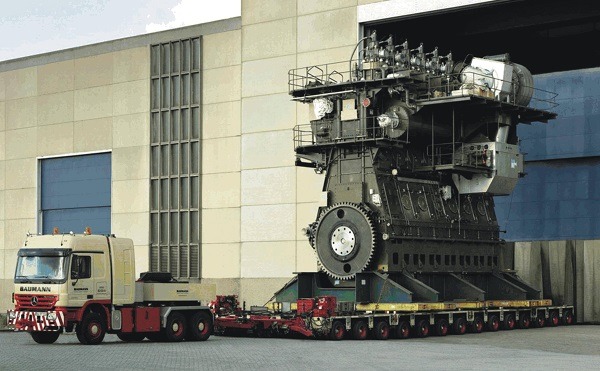Introduction 🌊
Fuel efficiency is a critical factor in marine transportation, affecting both operational costs and environmental impact. With rising fuel prices and stricter environmental regulations, optimizing fuel consumption has become a top priority for ship owners and operators. By maintaining engines properly, adopting advanced technologies, and optimizing vessel operations, significant fuel savings can be achieved. This article explores practical strategies to maximize fuel efficiency in marine engines while reducing emissions and operational costs.
1. Understanding Fuel Efficiency in Marine Engines ⛽⚙️
Fuel efficiency refers to the amount of fuel consumed per unit of work performed, typically measured in grams per kilowatt-hour (g/kWh). In marine engines, improving fuel efficiency involves reducing fuel consumption while maintaining optimal performance. Achieving this balance requires a combination of proper maintenance, advanced engine technologies, and efficient vessel operation.
Key factors affecting fuel efficiency include:
- Engine Design: Modern engines are designed for better fuel combustion and lower emissions.
- Fuel Type: Using low-sulfur fuels or alternative fuels like LNG can improve efficiency.
- Operational Conditions: Engine load, vessel speed, and environmental conditions affect fuel consumption.
2. Regular Maintenance and Engine Optimization 🧰🔧
Proper maintenance is essential for maximizing fuel efficiency and extending engine life. Regular inspections and timely repairs ensure that the engine operates at peak performance. Key maintenance practices include:
- Fuel Injector Maintenance: Clean and properly calibrated fuel injectors ensure optimal fuel atomization, improving combustion efficiency.
- Turbocharger Inspection: A well-maintained turbocharger increases air intake, enhancing combustion and reducing fuel consumption.
- Cooling System Checks: Maintaining the correct engine temperature prevents overheating and improves fuel efficiency.
- Lubrication System Maintenance: Using the right lubricants reduces friction and wear, improving engine performance.
- Monitoring Exhaust Emissions: Analyzing exhaust gases helps identify combustion issues, enabling timely adjustments.
3. Optimizing Vessel Operation for Fuel Efficiency ⚓🚀
Operating a vessel efficiently can significantly reduce fuel consumption. Key operational strategies include:
- Reducing Speed (Slow Steaming): Lowering vessel speed reduces fuel consumption, especially on long voyages. Even a small reduction in speed can lead to significant fuel savings.
- Optimizing Route Planning: Using weather routing and advanced navigation systems minimizes distance traveled and avoids adverse weather conditions, reducing fuel consumption.
- Maintaining Optimal Engine Load: Operating the engine at its optimal load range improves fuel efficiency and reduces wear and tear.
- Reducing Idle Time: Minimizing engine idling during port operations and waiting periods saves fuel.
4. Advanced Technologies for Fuel Efficiency 💡🌱
Modern marine engines are equipped with advanced technologies designed to improve fuel efficiency and reduce emissions. Key innovations include:
- Electronic Engine Control Systems: These systems optimize fuel injection timing, air intake, and combustion processes for maximum efficiency.
- Exhaust Gas Recirculation (EGR): EGR systems reduce nitrogen oxide (NOx) emissions and improve combustion efficiency.
- Selective Catalytic Reduction (SCR): SCR technology reduces NOx emissions by converting exhaust gases into harmless nitrogen and water.
- Air Lubrication Systems: By reducing friction between the hull and water, air lubrication systems decrease fuel consumption.
- Hybrid and Electric Propulsion: Combining traditional engines with electric propulsion reduces fuel consumption and emissions, especially during low-speed operations.
5. Fuel Management and Monitoring Systems 📊📡
Implementing advanced fuel management systems allows ship operators to monitor fuel consumption in real-time and make data-driven decisions. Key components of fuel management systems include:
- Fuel Flow Meters: Measure fuel consumption accurately, helping operators identify inefficiencies.
- Engine Performance Monitoring: Tracks key performance indicators such as engine load, fuel consumption, and exhaust emissions.
- Energy Efficiency Operational Indicator (EEOI): Calculates fuel consumption per ton of cargo transported, helping operators assess and improve efficiency.
- Voyage Data Recorders: Collect data on vessel speed, engine performance, and environmental conditions, enabling performance analysis and optimization.
6. Using Alternative Fuels for Greater Efficiency 🌱⚡
Switching to alternative fuels can improve fuel efficiency and reduce environmental impact. Common alternative fuels include:
- Liquefied Natural Gas (LNG): LNG burns more cleanly than traditional marine fuels, reducing greenhouse gas emissions and improving fuel efficiency.
- Biofuels: Renewable biofuels made from plant oils and animal fats offer a sustainable alternative to fossil fuels.
- Methanol and Ammonia: Emerging as low-emission fuels, methanol and ammonia are being tested for use in marine engines.
- Hybrid Fuels: Blending traditional fuels with biofuels reduces emissions while maintaining engine performance.
7. Reducing Hull and Propeller Resistance 🚢💨
Minimizing resistance is crucial for improving fuel efficiency, as it reduces the energy required to move the vessel through water. Key measures include:
- Hull Cleaning and Coating: Regularly cleaning the hull removes biofouling, which increases drag and fuel consumption. Applying advanced antifouling coatings further reduces resistance.
- Propeller Maintenance: Keeping propellers clean and well-maintained improves propulsion efficiency.
- Optimizing Hull Design: Modern hull designs reduce water resistance, improving fuel efficiency.
- Ballast Optimization: Reducing unnecessary ballast weight decreases the vessel’s displacement, reducing fuel consumption.
8. Crew Training and Awareness 👨✈️👩✈️
Educating crew members about fuel-efficient practices is essential for achieving long-term fuel savings. Training programs should cover:
- Efficient Engine Operation: Teaching crew members how to operate engines at optimal load and RPM for maximum efficiency.
- Fuel Consumption Monitoring: Encouraging crew members to monitor fuel usage and report deviations from expected consumption.
- Energy-Saving Practices: Promoting energy-saving habits such as minimizing equipment use when not needed.
9. Compliance with Environmental Regulations 🌱⚓
Compliance with international regulations, such as the International Maritime Organization’s (IMO) MARPOL Annex VI, is essential for reducing emissions and improving fuel efficiency. Key requirements include:
- Energy Efficiency Design Index (EEDI): Sets minimum energy efficiency levels for new ships, promoting fuel-efficient designs.
- Ship Energy Efficiency Management Plan (SEEMP): Requires ship operators to develop plans for improving energy efficiency.
- Sulfur Emission Control Areas (SECAs): Limit sulfur content in marine fuels, reducing air pollution and encouraging the use of cleaner fuels.
10. Future Trends in Marine Fuel Efficiency 🚀🔮
The future of marine fuel efficiency lies in innovative technologies and sustainable practices. Emerging trends include:
- Autonomous Ships: Using AI and automation to optimize navigation and fuel consumption.
- Carbon Capture and Storage (CCS): Capturing carbon dioxide emissions from ship exhausts to reduce environmental impact.
- Advanced Propulsion Systems: Developing electric and hydrogen-powered propulsion systems for zero-emission shipping.
- Digital Twins: Using digital simulations to optimize engine performance and vessel operations.
Conclusion 🏁🌊
Maximizing fuel efficiency in marine engines is essential for reducing operational costs and minimizing environmental impact. By maintaining engines properly, optimizing vessel operations, and adopting advanced technologies, ship operators can achieve significant fuel savings. As the maritime industry continues to evolve, innovations such as alternative fuels, autonomous ships, and digital monitoring systems will play a crucial role in creating a more sustainable and cost-effective future for marine transportation.


